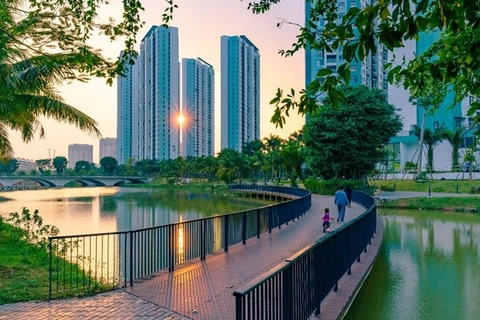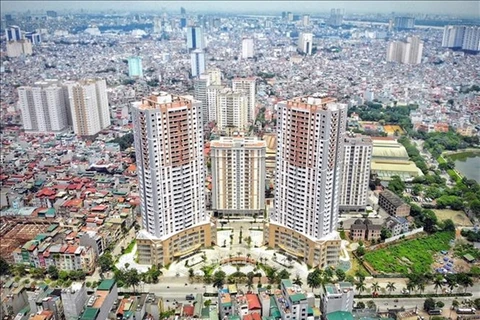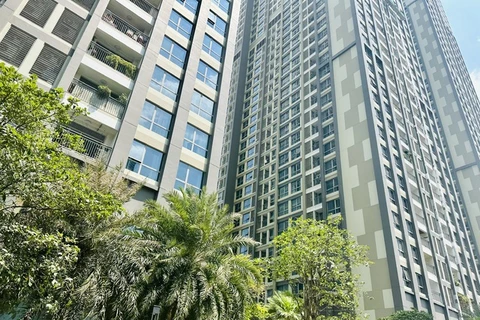Hanoi (VNA) – Industrial real estate has been a bright spot in the market thanks to a large amount of foreign investment inflows, great potential and high absorption capacity, according to experts.
Under the industrial park (IP) planning, Vietnam has 563 IPs with a total area of 210,900 hectares, including 361 outside and 37 inside economic zones, and eight in border economic areas.
Thomas Rooney, Senior Manager of Industrial Services at Savills Hanoi, said that Vietnam has lower economic risk than other emerging countries such as Myanmar, Bangladesh, Laos, Cambodia, and Malaysia.
At the same time, Vietnam has great advantages in labour supply and export opportunities to China, along with stable domestic consuming power, he said.
However, the expert held that although Vietnam is one of the countries that invest strongly in infrastructure system at 5% of the GDP, it needs to pay greater attention to expressway, deep-water port and service port projects. He advised Vietnam to make more investment in human resources and infrastructure to increase the attractiveness of industrial property in the time to come.
Statistics from CBRE Vietnam showed that as of the first quarter of 2023, the accumulated supply of industrial land in tier-2 markets in both the north and the south reached more than 20,300 hectares, of which more than 57% of the total supply was in the south. Both regions recorded a positive absorption rate of new leasable space in 2022, in which the new leasable area of the north increased by 35% year on year, while the southern market recorded an average growth of 58% year on year.
Strong demand from manufacturers as well as enhanced competitive advantage in the tier-2 markets have supported the industry's recent activities in these markets. These areas are being offered for rent at more competitive rates than the tier-1 markets, while the available land reserve offers tenants more options.
At the same time, key infrastructure projects in both the north and the south have recently come into operation, thus improving connectivity from provinces to major cities.
Thanh Pham, Associate Director of Research and Consulting Department at CBRE Vietnam, said that as some locations in industrial zones in the tier-2 markets offer incentives on income tax and land rent reduction and exemption, the markets have attracted large-scale manufacturers and ready-built factory operators.
In the period from 2022 to the first quarter of 2023, CBRE recorded large-scale transactions with a scale of 10 hectares or more in northern provinces such as Bac Giang, Thai Binh, and Quang Ninh, mainly in the electronics and automobile sectors, she said./.
Under the industrial park (IP) planning, Vietnam has 563 IPs with a total area of 210,900 hectares, including 361 outside and 37 inside economic zones, and eight in border economic areas.
Thomas Rooney, Senior Manager of Industrial Services at Savills Hanoi, said that Vietnam has lower economic risk than other emerging countries such as Myanmar, Bangladesh, Laos, Cambodia, and Malaysia.
At the same time, Vietnam has great advantages in labour supply and export opportunities to China, along with stable domestic consuming power, he said.
However, the expert held that although Vietnam is one of the countries that invest strongly in infrastructure system at 5% of the GDP, it needs to pay greater attention to expressway, deep-water port and service port projects. He advised Vietnam to make more investment in human resources and infrastructure to increase the attractiveness of industrial property in the time to come.
Statistics from CBRE Vietnam showed that as of the first quarter of 2023, the accumulated supply of industrial land in tier-2 markets in both the north and the south reached more than 20,300 hectares, of which more than 57% of the total supply was in the south. Both regions recorded a positive absorption rate of new leasable space in 2022, in which the new leasable area of the north increased by 35% year on year, while the southern market recorded an average growth of 58% year on year.
Strong demand from manufacturers as well as enhanced competitive advantage in the tier-2 markets have supported the industry's recent activities in these markets. These areas are being offered for rent at more competitive rates than the tier-1 markets, while the available land reserve offers tenants more options.
At the same time, key infrastructure projects in both the north and the south have recently come into operation, thus improving connectivity from provinces to major cities.
Thanh Pham, Associate Director of Research and Consulting Department at CBRE Vietnam, said that as some locations in industrial zones in the tier-2 markets offer incentives on income tax and land rent reduction and exemption, the markets have attracted large-scale manufacturers and ready-built factory operators.
In the period from 2022 to the first quarter of 2023, CBRE recorded large-scale transactions with a scale of 10 hectares or more in northern provinces such as Bac Giang, Thai Binh, and Quang Ninh, mainly in the electronics and automobile sectors, she said./.
VNA
























